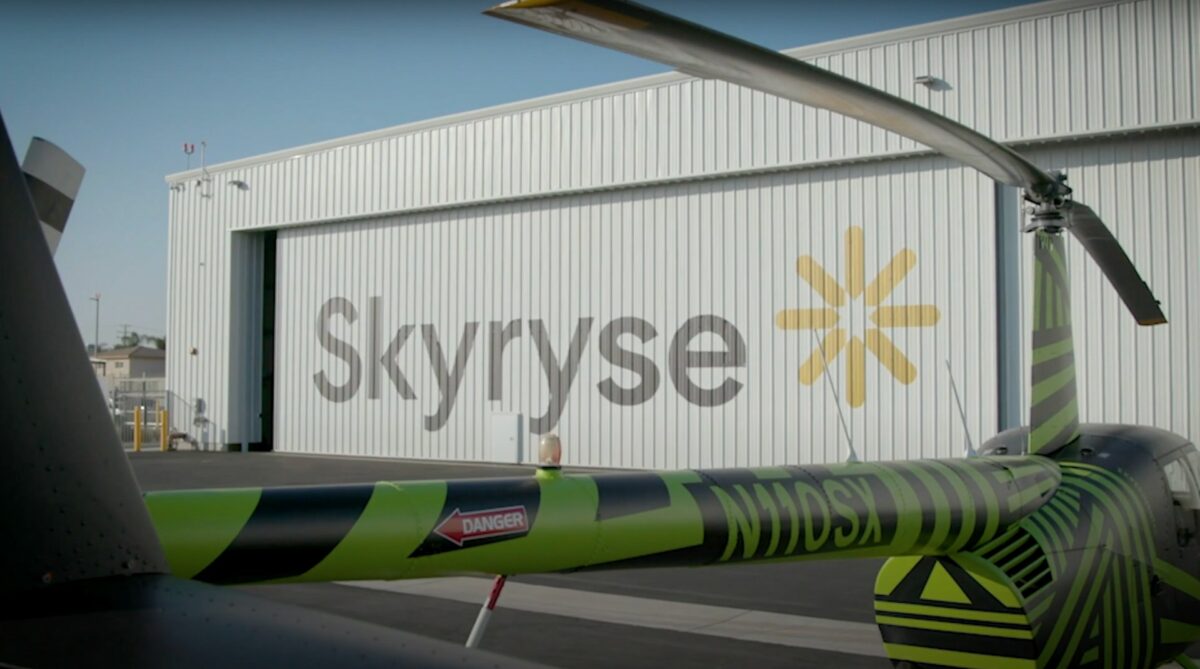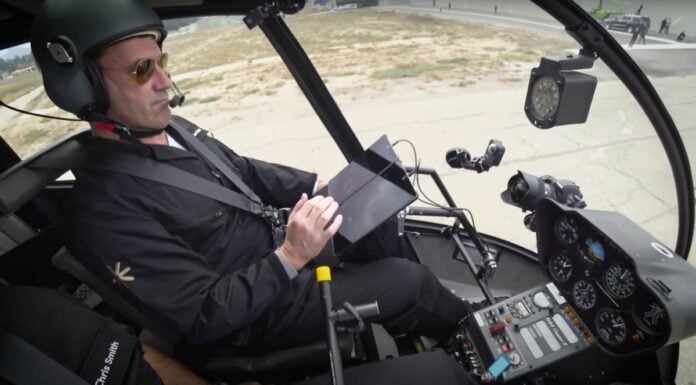El Segundo aviation startup Skyryse has grown significantly since its 2016 founding and in the last year has secured Series B funding, tripled its headcount, secured multiple partnerships and stayed on track for FAA approval of its flagship technology.
The company’s goal of making urban air travel accessible to everyone revolves around FlightOS, Skyryse’s flagship operating system that simplifies flight controls down to a touchscreen and a joystick. Skyryse has so far garnered roughly $250 million in financial support from venture capitalists.
The company’s software can be used by trained and novice pilots alike, and in addition to making flight more accessible, FlightOS is being touted as a safer way to fly.
“Skyryse’s FightOS manages the dynamic flight controls for the pilots so they can focus on the high-level decision-making that depends on their experience rather than spreading their attention too thin among primary flight controls and dynamic flight tasks on top of those critical decisions,” the company wrote in a statement to the Business Journal.
The operating system can also handle emergency situations such as complete power loss. Engine failure is a circumstance that can potentially be remedied by performing a maneuver called an autorotation, which can also be handled by FlightOS. The company proved the software’s ability last fall, when a helicopter retrofitted with FlightOS conducted an autorotation and controlled the aircraft’s descent with no intervention from the pilot or power from the engine.
Skyryse’s tech will be geared toward civilian and emergency responder use. The company has not stated that it will be designated for military use.
Replacing old systems
The software also has flight-control computers and actuators that take the place of mechanical systems on aircraft such as the Robinson R66, a helicopter that the company hopes will be the first craft available with FlightOS. Skyryse wrote that it is on track for the Federal Aviation Administration (FAA) certification needed to make that hope a reality.
“[Companies] can work in research and development as long as they [can] and when they’re ready, go to the FAA and open a [certification] project,” Nick Olmsted, lead official development assistance administrator at Kilroy Aviation, said. “To me, this is probably an 18-month to three-year project, depending on where they started from.”
What makes Skyryse’s certification path unique is that it is applying for a supplemental type of certification on an existing aircraft and has a system that fits within standards that already exist, effectively removing the need for the FAA to write entirely new standards for the technology.
If successful in getting multiple types of aircraft certified, the company stands to alleviate some of the aviation industry’s pilot shortage via the reduction of training hours needed to pilot fixed-wing and rotor aircraft.

Changing strategy
A product shift made about two years ago by the company is also helping its case with the FAA. Skyryse once had its sights set on developing a semi-autonomous air taxi service before switching to the system it has now. Fully automated flight is not currently certifiable with the FAA and has been viewed cautiously by aviation regulators.
“No matter how robust the design is, we can’t mitigate everything out there. We just can’t, and we’ve proven that over the years with self-driving cars,” Bob Fox, first vice president and national safety coordinator at the Air Line Pilots Association, said at a panel at this year’s AIAA Aviation Forum and Exposition.
Even though Skyryse has some advantages in its favor, Olmsted said securing a certification isn’t easy work, partially because of the sheer number of variables involved.
“If I break this down into the disciplines involved, you’ve got structures, mechanical, electrical software, flight test and flight handling discipline,” Olmsted said, adding that Skyryse’s path to certification is a doable task if the software’s design maturity, system safety and flight tests produce the right numbers.
“They’re working with Air Methods, so they have an understanding of flight tests, flight safety and system safety, so maybe they’re there, maybe they’re not. But from what I can see, they’ve got a savvy, smart operation,” Olmsted said.
Partnerships have been a priority for Skyryse as it looks to bring its technology to original equipment manufacturers and aircraft operators like Air Methods.
Skyryse’s partnership with Air Methods, one of the country’s largest emergency medical services helicopter operators, was announced at the end of this April and is one of the company’s more notable partnerships.
Under the terms of the partnership, more than 400 single-engine helicopters and fixed-wing aircraft in the Air Methods fleet will be retrofitted with FlightOS, assuming FAA certification is achieved for the Robinson R66 and other aircraft models in the Air Methods fleet. Air Methods also invested $5 million into Skyryse’s Series B funding round, which was led by Fidelity Management & Research Co. and Monashee Investment Management.
“The results of deploying this technology will first and foremost improve safety, lower cockpit workload, and allow our fleet to fully maximize the potential of patient care in a wide range of aircraft models and types,” Air Methods Executive Vice President of Operations Leo Morrissette said in a statement.
Outside of Air Methods, Skyryse has partnerships with five original equipment manufacturers in the aviation industry that collectively provide more than half of the world’s new general aviation aircraft.
The company currently has 90 employees and is looking to increase the size of its team in the coming year. A tight labor market, though, is making this difficult, the company wrote in an email.
Despite the challenges, hirings at the executive level were recently made with the July additions of Stephen Koo, Skyryse’s first chief financial officer, and Justin Ryan, the company’s new chief operating officer. Koo previously served as CFO of NEOGOV, an HR software company, while Ryan once served as the vice president of Honeywell Aerospace’s Airbus business segment.
“With his diverse financial experience across public and private companies, [Koo] will help Skyryse pioneer new business models for the transportation industry,” Dr. Mark Groden, Skyryse’s founder and chief executive, said in a statement. “[Ryan] knows firsthand the challenges of piloting and the challenges of this industry, and his extensive aviation work with civilian and military organizations will make our FlightOS system even stronger.”

